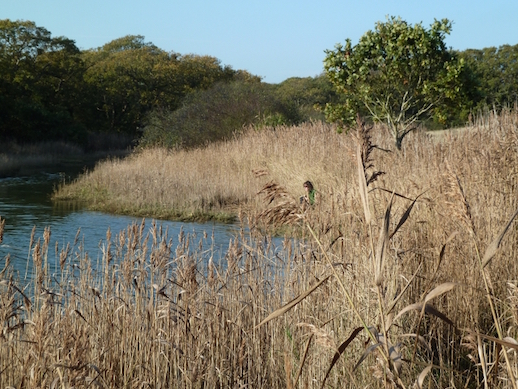An extract from Estuary, a collection of essays by Lydia Fulleylove
October 2010 Prelude
Out, over the churchyard wall onto Causeway Field. This is our first expedition off-public path and it feels as if we’re trespassing, even though we have permission to go anywhere. We follow the edge of the field to the rough marshy land towards the river, reeds hiss and the north east wind carries away the noise of the nearby town and harbour. There’s a heron, an extension of the silver-grey dead tree it’s landed on. Across the rippled steel of river, a redshank rises from the salt-marsh. One small oak stands alone, between copse and river. It’s to become an Estuary landmark, to which my eyes are always drawn, perhaps because it settled itself in my mind that first walk. Others accumulate as the months pass: that particular gap in the blackthorn hedge through which I glimpse the salt-marsh; the slant line of river across the narrowing end of Long Ground, the glimmer of the reeds beyond Estuary Moor. I don’t know this place yet, I write in my notebook later, as if one can ever completely know a place but perhaps what I mean is that it’s not yet in my heart or on my inner map.
We follow a deep-trod cow-path up the side of the field, across a clover meadow, a ditch, another reed bed. A thin creek twists down to the river. We see the heron’s hidden pond. Mallard fly up from willows, an egret flaps further down stream. The estuary is very blue. The reeds hiss, the tide ebbs. Then, unmistakeable – Courlee, courlee, courlee, sound-mark of the estuary, the curlew’s cry.
Over there, towards the lane end of the field, the herd of black Aberdeen Angus and the bull with ring in his nose take no notice of us. We walk past them, up-hedge and climb over the gate back onto the footpath.
Lydia Fulleylove is an author and poet. Estuary is available to purchase here.
